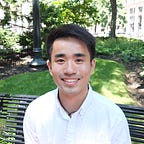To MD or not MD
The journey of an existential pre-med
Entering college, I had every intention of going to medical school. I joined the stampede of freshman year pre-meds and I found myself racing through the pre-med requirements to finish most of the required courses by the end of sophomore year. To me, working in healthcare was one of the most direct ways I could impact the lives of others, and I felt drawn to the noble and intimate profession of medicine. But at the same time: I had this inescapable curiosity in technology — this deep gratification that came with designing and building things that could be used by so many people.
As I got more immersed into the clinical world through shadowing and volunteering at free clinics, this duality caused me to be routinely bothered by the state of technology in healthcare. And though I couldn’t put my finger on it at the time, I realize that it was this tension that caused me to make a concerted shift in the balance of my studies towards Computer Science.
After giving biomedical computation a serious run, I realized that Digital Health was really the intersection of technology and healthcare that I was looking for — a discovery that I attribute a large part to Marta, SHIFT’s first champion and one of my closest mentors. Other folks I looked up to (Dr. Oliver Aalami and Ryan Panchadsaram) were among many living examples of how one can change healthcare from both inside and outside of traditional medicine.
With this realization, I started to gravitate towards this notion of leveraging technology to create meaningful value in healthcare — a personal mission that eventually manifested into the vision behind SHIFT. In retrospect, our intellectually diverse group was running a longitudinal experiment on what it takes to make an impact in healthcare. But instead of clarifying the original hypothesis, our multidisciplinary experiment just made things…more interesting. We had such a fascinating collective of students that naturally started to pull me away from my initial focus on healthcare and technology. My time with SHIFT really changed my two-road intersection into a traffic circle of possibilities across public health, healthcare economics, healthcare management and health policy: at the center of which were (1) what change in healthcare really looked like and (2) what meaningful value really meant in healthcare?
As I started to explore these questions more deeply, I quickly found that value meant different things depending on the lens that you’re using to look at healthcare. I needed a framework to understand healthcare, its stakeholders, and an overarching strategy for delivering and creating value in such a complex system. This desire formed some of my original intentions behind a MS in Management Science & Engineering. Case-study courses like MS&E 270 and John Hernandez’s MS&E 257 were some of the memorable highlights that catalyzed the inklings of a framework in thinking about healthcare.
As I’ve drifted away from the well-trodden path of medicine, I maintain that there’s a tension that I have with being somewhat of “an outsider” to healthcare. Without the day-to-day immersion in the healthcare system, I often worry if I’m operating at too much of an abstraction or with too limited an access to the real problems in healthcare.
This was particularly frustrating in a 6-month exploration with MED275B. Even with our “student” cards and strong advisor support, we found friction throughout our prototyping journey. It came to the point where we ultimately resorted to generating our own medical claims data to build a trojan horse just to get our foot in the door.
As a recent graduate and now a working professional, the loss of the “pre-med student card” is especially apparent to me. And in a lot of ways, the user-centric and needs-driven perspective of the product profession that I’m in now is accelerating this realization. As I’ve become indoctrinated in the ins-and-outs of product exploration and customer discovery, I find the empathy required to understand the needs and users of healthcare is incredibly hard to build. The cross-functional generalist in me is constantly straining to hear the voice of the mythical user-specialist that can articulate their needs and frustrations. Often times, it’s this palpable “insider” vs. “outsider” barrier that seems to be muffling the jumbled voices of the healthcare system.
It’s certainly true that the healthcare “insider” vs. “outsider” mentality has begun to break down as healthcare has become more innovative and collaborative, but part of me continues to wrestles with the type of impact I should have on healthcare as I’ve begun to realize what the type of perspective it takes to change it. I’ll be the first to admit that medical school has yet to be completely eliminated as a long-term option. Interceding directly with patients, working within the system, and acting as an internal catalyst for changing healthcare remains a latent dream of mine.
I believe, however, that this is a healthy tension…and suspect that it is a tension shared across both sides of this deconstructing divide. We need more folks that feel uncomfortable enough with this tension to channel exasperation into action. For me, I hope that this tension is less of a debate and more of a driving force — one that hopefully leads me to be part of the changing tide of healthcare.
